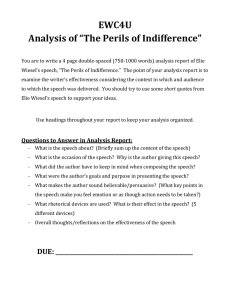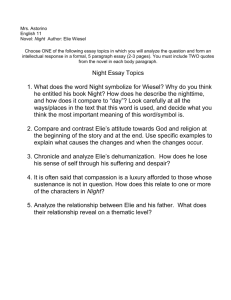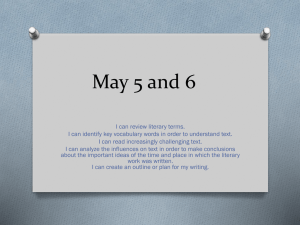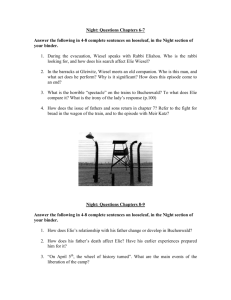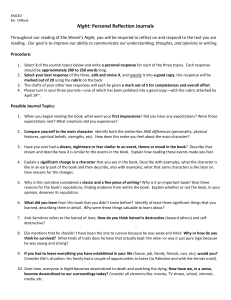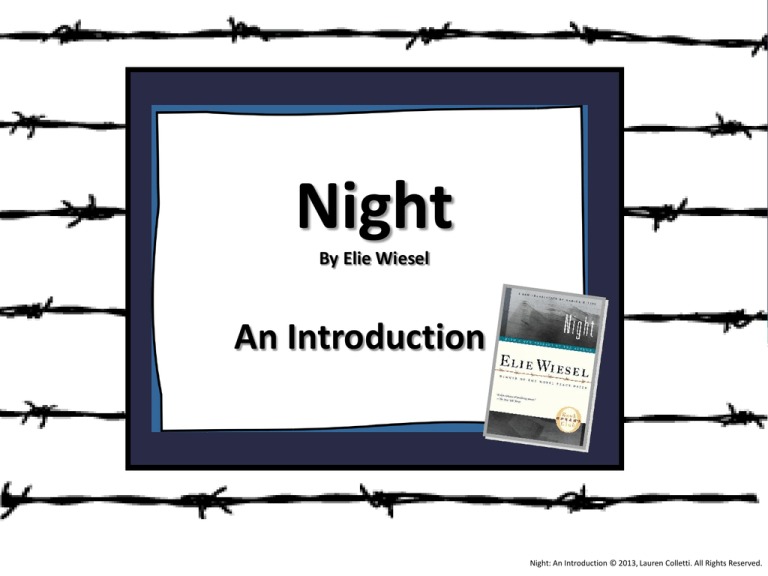
Night
By Elie Wiesel
An Introduction
Night: An Introduction © 2013, Lauren Colletti. All Rights Reserved.
Why?
• When we study the Holocaust, inevitably these
questions come up:
▫ Why did Hitler hate the Jews?
▫ Why were the Jews scapegoated and targeted?
• To begin to address these questions, it is
important to look at the history of Judaism.
Differences Breed Suspicion
• The Jews were considered highly unusual and
suspect because of their different beliefs and
practices.
• The roots of anti-Semitism lie in the different
practices of the Jews as compared to the other
populations they lived with.
• Anti-Semitism: hostility to or prejudice
against Jews
Education & Work
• As a result of limited rights and the inability to own property , the community
encouraged a focus on education.
• belief that once a person is educated, no one can take away their education.
• The members of the Jewish community were often more educated than the
locals.
• Jews often set up shop as merchants because it was one of the few employment
options allowed them.
• Being merchants allowed them to pick and move if
necessary, taking their goods with them
and setting up in a new place.
Modern History and World War II
• These same differences contributed to the prejudice that
Hitler espoused during the era leading up the World War II.
• Germany was in a serious economic depression due to the
steep reparations paid after World War I.
• The Jewish community had been contributing to the
German economic system in a positive manner for
generations, but during the difficult years, some were
better-off than their neighbors.
Scapegoating
• This success bred resentment as well as an environment in
which it was easier for Hitler to create a scapegoat to blame
for Germany’s economic crisis.
• Hitler referred to the Jews as “foreigners,” “exploiters,”
“robbers,” and “destroyers of civilizations.”
• His anti-Jewish propaganda united a weary German
population looking for someone to blame for their
problems.
• In this environment, the tracks were laid in order for a
genocide of unimaginable brutality to take place.
The Holocaust
• Persecution began
in 1934
• Deaths and WWII
didn’t begin until
1939
• The Yellow Star
• “Jude” is German
for Jew
The Holocaust
• 1933: Jewish
population of
9,000,000 in
Europe
• 1945: 2 out of
every 3 had been
killed—pop. of 3
million
The Holocaust
• Death Camps:
mass murders
of Jewish pop.
• Gassing,
shooting, fire,
starvation,
maltreatment
• Most infamous:
AuschwitzBirkenau
Auschwitz
• Largest Death
Camp
• 4 gas chambers
in operation
• Up to 6,000 Jews
gassed each day
• Children and dead
bodies burned in
ovens
The Holocaust
• April 30, 1945—
Hitler commits
suicide
• German
surrender May
7, 1945
Night by Elie Wiesel
In Night, published in 1958, Elie
Wiesel recounts his experiences
during the Holocaust.
Night is part of a trilogy; it is
followed by Dawn, then Day.
Elie Wiesel
• Elie Wiesel was born in
Sighet, Romania, on
September 30, 1928.
Town of Sighet
Transylvania (Romania after 1940)
Life in Sighet
In Sighet, Elie lived with his mother,
Sarah, his father, Shlomo, his older
sisters Hilda and Bea, and his younger
sister Tzipora.
Elie’s parents ran a store.
Elie’s little sister, Tzipora.
Wiesel Home, Sighet.
Elie’s Childhood
Elie Wiesel:
“My childhood was really a
childhood blessed with love and
hope and faith and prayer. I come
from a very religious home and in
my little town I was not the only
one who prayed and was loved.
There were people who were
Elie Wiesel with his mother and sisters.
poorer than us, yet in my town,
we were considered to be not a wealthy family, but well-to-do, which
means we weren't hungry. There were people who were.”
http://www.achievement.org/autodoc/photocredit/achievers/wie0-009
Shlomo Wiesel, Elie’s Father
Elie’s father, Shlomo, was a
respected member of the
community.
“My father was a cultured man,
rather unsentimental. He rarely
displayed his feelings, not even
within his family, and was more
involved with the welfare of others
than with that of his own kin. The
Jewish community of Sighet held
him in highest esteem; his advice on
public and even private matters was
frequently sought.”
Night by Elie Wiesel, page 4
Elie’s Religious Life
Elie, a teenager devoted to
studying the Kabbalah, found a
teacher in Moishe the Beadle.
“I met him in 1941. I was almost
thirteen, and deeply observant.”
After Moishe had a terrifying
experience, he tried to warn the
town of Sighet of impending
danger, but no one believed him.
By the time they found out
Moishe was right, it was too late.
Temple in Sighet
“Today, out of two temples, six
synagogues and 13 prayer houses only
the Igniter Klaus Temple is left. It was built
in 1885, rebuilt, repaired and restored in
1936, 1950, 1970 and 1981.”
http://www.romaniajewishtours.com/synagoges-and-cemeteries/#sig
Elie Wiesel
Elie was just 15 years old when the Nazis invaded his
hometown, and changed his life
forever.
Interview with Elie Wiesel
In this video clip, Elie Wiesel
returns to Auschwitz with
Oprah Winfrey, who interviews
him about his experiences.
As you view…
•
Jot down 5 facts and 2
questions about the
Holocaust.

